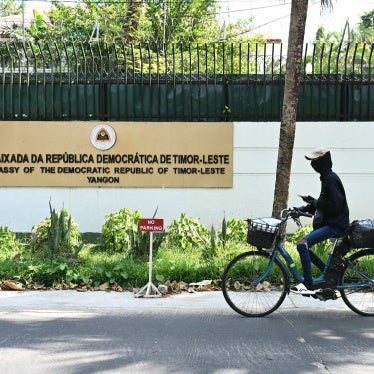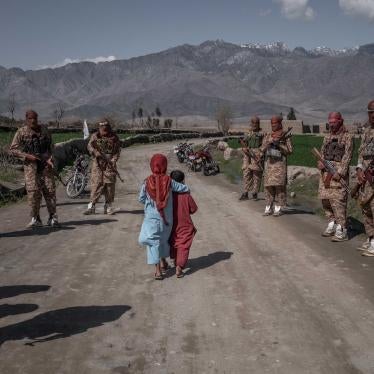The undersigned organisations welcome the call you made to the Human Rights Council on June 21, 2021, to consider “mechanisms for an effective prevention response” to the rapidly deteriorating situation in Afghanistan. We are writing to urge you to take action to support the establishment of a United Nations-mandated Fact-Finding Mission in Afghanistan, as requested by the Afghanistan Independent Human Rights Commission (AIHRC).
As you know, on June 8, 2021, insurgents carried out an attack on civilian deminers working for the Halo Trust in Baghlan province, with reports that the attackers were seeking out members of the Hazara Shia community. This followed the May 8, 2021 massacre of schoolgirls as they were leaving the premises of Sayed-Ul-Shuhada school in Dasht-e Barchi precinct of Kabul, a predominantly Hazara-Shia neighbourhood. These horrific attacks came after other attacks on civilians including a suicide bombing at Kabul University that killed at least 19 people, mostly students, and injured 22 others in November 2020; an attack at a maternity hospital in Dasht-e Barchi in May 2020 which killed 24 civilians including 11 mothers and a midwife, while newborns and other patients and staff were injured; and the attack on a Sikh temple in March 2020 that killed 26 civilians and injured 11 others. In addition, since September 2020 there has been an increased targeting of human rights defenders, women rights defenders, and journalists.
These atrocities have prompted the AIHRC to request an international fact-finding mission to look at attacks on Hazaras and other religious minorities, attacks on women and girls, and targeted killings of human rights defenders and other civilians since January 2020. According to the AIHRC’s call, the fact-finding mission should also investigate attacks against girls’ education and against healthcare centers in Afghanistan. The AIHRC says that the scale and nature of these attacks is beyond the capacity of the government, AIHRC or the United Nations Assistance Mission in Afghanistan (UNAMA) to investigate.
We agree with the AIHRC position that a Fact-Finding Mission should be set up to do the following:
- Investigate and establish the facts and circumstances regarding the alarming increase in attacks targeting civilians since January 2020, and the underlying patterns of abuse, such as systematic discrimination, including targeting of the Hazara-Shia and the Sikh communities and repression based on gender, that amount to violations and abuses of international human rights law and international humanitarian law;
- Collect, consolidate and analyze evidence and documentation and review alleged violations and abuses of international human rights law and international humanitarian law by all parties;
- Identify, where possible, those responsible, with a view to ensuring that the perpetrators of violations are held accountable;
- Secure an effective and coordinated response by the national authorities and the international community, in close cooperation with OHCHR/UNAMA and the AIHRC, to ensure accountability and deter any further targeted violence against civilians in particular ethnic and religious minorities;
- Make recommendations, in particular on accountability measures, with a view to avoiding and ending impunity and ensuring legal accountability, including individual criminal liability;
- Make recommendations for improving access to justice and obtaining reparations for victims and survivors.
To help bring an end to the cycle of violence and impunity against civilians in Afghanistan and establish a measure of accountability, we urge you to continue to actively support the creation of this urgently needed mandate by the UN Human Rights Council.
Please accept the assurances of our highest consideration.
Sincerely,
Mary Akrami, Executive Director
Afghan Women’s Network
Sayed Hussain Anosh, Executive Director
Civil Society and Human Rights Network (CSHRN)
Federico Borello, Executive Director
Center for Civilians in Conflict (CIVIC)
Agnès Callamard, Secretary General
Amnesty International
Charles Davy, Managing Director
Afghanaid
Samiullah Hamidee, Director
Organisation for Social and Economic Development (OSED)
Guissou Jahangiri, Executive Director
Armanshahr/OPEN ASIA
Hadi Marifat, Executive Director
Afghanistan Human Rights and Democracy Organization
Alice Mogwe, President
FIDH/International Federation for Human Rights
Horia Mosadiq, Executive Director
Safety and Mitigation Risk Organization
Suraya Pakzad, Executive Director
Voice of Women Organization (VWO)
Ehsan Qaane, Co-Founder and Member
Transitional Justice Coordination Group (TJCG)
Aziz Rafiee, Executive Director
Afghanistan Civil Society Forum-Organization
Aziz Rafiee, Chairperson
Afghanistan Human Rights Defenders Committee
Kenneth Roth, Executive Director
Human Rights Watch
Mahbouba Seraj, Executive Director
Afghan Women Skills Development Center
Mohammad Shafaq, Executive Director
Afghanistan Young Greens (AYG)
Niccolò Figá Talamanca, Secretary General
No Peace Without Justice
Elizabeth Winter, Executive Director
British and Irish Agencies Afghanistan Group (BAAG)
Sam Zarifi, Secretary General
International Commission of Jurists







